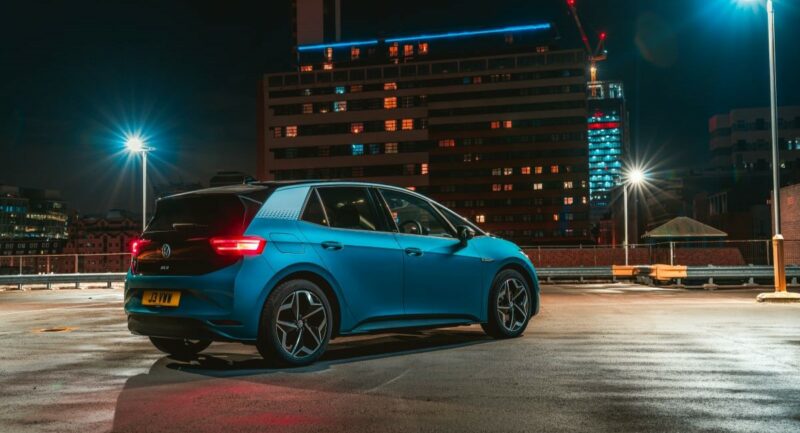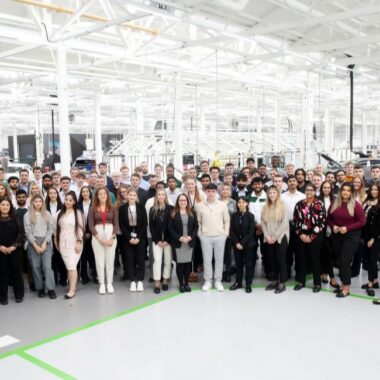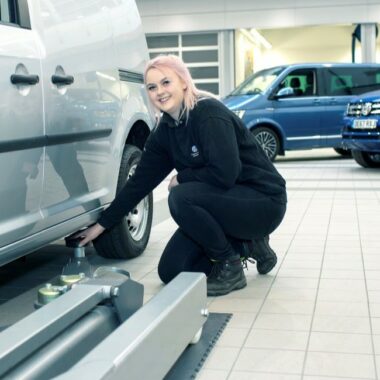Practical driving tests will soon be conducted almost exclusively in automatic electric cars, according to one electromobility expert.
Emma Loveday, EV Consultant at Volkswagen Financial Services UK, explained that young people learning to drive in automatic vehicles will ‘soon be the norm’ as consumers become more environmentally conscious and cost savings for green transport become more prominent.
Between 2009/19 and 2019/20, figures from the DVSA show that the number of drivers taking practical tests in an automatic car rocketed 183%. The number of passes in these vehicles increased by 187% over the same period.
In addition, with many electric vehicles being automatic, this data leads industry experts to reason that demand for sustainable travel is behind the uptick in automatic tests.

Emma Loveday, EV Consultant at Volkswagen Financial Services UK, said: “We know that Gen Z and Millennial drivers are keen to go green and it looks like this demand is manifesting itself in more young people wanting to make an EV their first car – and therefore taking lessons and passing their driving test in automatic vehicles. It’s been well documented that climate change, the environment and preservation of the planet is very much an issue that young people are concerned about. This is evidence of that awareness and desire to make greener choices as a young consumer.
“By 2030 the sale of new petrol and diesel cars will be banned, and with electric cars being automatic by design, we shouldn’t be surprised by a surge in demand from young people learning to drive in an automatic. I imagine this trend will actually be the norm, and not the exception, sooner than we expect, and it’s up to the automotive industry to help facilitate this shift in consumer behaviour.
“Driving is expensive, with high insurance premiums for young drivers and especially in the current climate, unprecedented rises in fuel costs. By driving an EV, young people can avoid significant petrol and diesel fuel expense as well as avoid charges such as the London Congestion Charge or Clean Air Zones (CAZ), which are being introduced by more local authorities. This could well explain why we’re seeing a surge in automatic drivers, particularly in the capital.
“In the long run, electric cars are more affordable; however the upfront cost to purchase a new EV, compared to an ICE vehicle, is noticeably more. This is still a barrier to an EV being a young person’s first car. The second-hand EV market is growing, and this will definitely help young people and consumers on a budget access an EV more easily as it will make the vehicles more affordable.
“Bear in mind however, that a lot of young people live in towns and cities, which will have significant housing that won’t have off street parking and therefore no possibility of a having their own charging point at home. So in order to support young drivers with EV adoption, local authorities need to be investing in suitable, reliable, and accessible public charging infrastructure in their urban communities.
About Volkswagen Financial Services
Volkswagen Financial Services are a business division of the Volkswagen AG group of companies and comprise Volkswagen Financial Services AG along with its associated companies, Volkswagen Bank GmbH, Porsche Financial Services, and the financial services companies in the USA and Canada that belong directly or indirectly to Volkswagen AG – with the exception of the financial services of the Scania brand and Porsche Holding Salzburg. The key business fields embrace dealer and customer financing, leasing, the bank and insurance business, fleet management and mobility offers. Volkswagen Financial Services have a total of 16,558 employees worldwide, Volkswagen Financial Services report total assets of around EUR 225.6 billion, an operating result of EUR 2.8 billion and a portfolio of around 21.9 million current contracts (as at: 31.12.2020).














